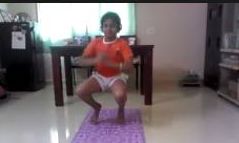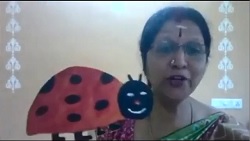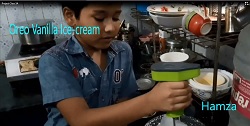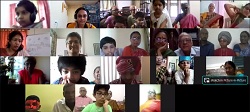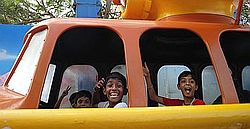Elementary is a mixed age grouping of 6 to 11 year-old children. They become intellectual in nature and begin to move from concrete to abstract reasoning. They develop morality and imagination based on the reality they know. They acquire knowledge and information effortlessly because of their innate passion for learning. They learn through discovery and creative problem solving. It is through the child’s own exploration, imagination and creativity that concepts are understood and mastered. Children have different areas of work that includes languages (English, Tamil and Hindi), History, Geography, Physical Science, Biology, Arithmetic, Geometry, Algebra, Arts & Crafts, Performing Arts, Physical education.
He is entering a new period in his life; this imaginative, social, creative child needs a planned environment and expansive course of study to support his burgeoning independence and potential. The Montessori Elementary program, for children between the ages of six and eleven, is designed to meet the needs of your child in this phase of development. This experience will shape not only his knowledge and skills, but also his attitude about learning for the rest of his life.
The Montessori elementary is built on the foundations of the primary.
The elementary classroom environment is beautifully and thoughtfully prepared to support independent learning; it is child-centered, not adult-centered. There is access to the outdoors and the kinds of learning that can only take place in nature.
The elementary “curriculum” is only limited by a child’s imagination
The goal of a traditional curriculum is to delineate what a child is supposed to learn. In Montessori, we want your child to be able to learn everything! The starting point for all courses of study is the “Great Lessons”; these impressionistic and scientific stories are presented every year and give the students the “big picture” of cosmology, astronomy, earth science, geography, chemistry, physics, biology, history, anthropology, cultural and social studies, language, math, music, and art. Subsequent lessons offer the children keys for exploring these areas of human knowledge in more detail. The lessons are starting points for your child’s own activity. Meaningful learning happens when children are inspired by a lesson and begin to explore the subject and work on their own, children work collaboratively and cooperatively.
Elementary children have a strong drive to be social and to collaborate. For this reason, most of the lessons and follow-up projects in elementary are done in pairs or groups of children. Each day, your child will practice the social skills necessary to plan and carry out his projects: delegation and division of labor, sharing resources, making group decisions, taking responsibility for actions, and celebrating the success of peers. Conflict is not uncommon, but the motivation to resolve it comes from the children and their engagement with their projects. The Montessori teacher models and supports constructive and respectful problem solving.
The classroom is designed to nurture imagination and reason.
Elementary age students are naturally curious and have a strong internal drive to discover how our world works. They may ask, “How does a fish breathe under water?” “What number comes after a trillion?” “What causes a volcano to erupt?” Instead of simply giving them the correct answers, Montessori elementary teachers ask the right questions; they tell stories to inspire the children’s imagination and tantalize them to explore on their own to find out more: about volcanoes and dinosaurs and Monet and gladiators and poppies and skateboards and butter churning and cheetahs and – there is no limit! Driven by their passions, the children are open to the input from the teacher that refines their reading, writing, reasoning, and research skills. Designing our elementary program around the children’s natural cognitive abilities means that our focus is less on the facts and concepts we teach and more on what the children learn and how they learn it
The children’s work is open-ended and creative.
Each child’s response to a lesson is unique, and their follow up work reflects those individual differences. Your child is free to form or join a group to work with the concepts introduced in a lesson. For example, a group of children might have a lesson on the parts of a river. Some might choose to label an outline map with the rivers of India. Others might choose to repeat the demonstration with the river model (and without the teacher), labeling for themselves the parts previously demonstrated. Another pair might be intrigued by a particular river mentioned in the lesson or by the river running through their city, and they might launch a research project about the Ganges or the Cauvery. Because the children are free to move around the classroom and see what others are doing, it’s not uncommon for an idea to spread; children are stimulated not just by the teacher’s lessons, but by each other.
The children are empowered to seek knowledge beyond the classroom.
An important component of the elementary program is what we call “Going Out.” Going Out occurs for a group of children when exploration of a topic exhausts the resources of the classroom. We want the children to be comfortable navigating the world, not just our classrooms. So, we have a few excellent books, but not everything there is to read about a topic. We have many evocative art and construction materials, but probably not the one perfect thing that a group of children need to build their model. As a result, the children must “go out” beyond the limits of the classroom to find the information or resource that they need.
A Going Out is a planned undertaking by a small group of children. They find a resource in the community, schedule the outing, arrange for their own transportation and supervision (by staff or parent volunteers), prepare themselves for the experience, conduct themselves with dignity while out in public, and return to share their research with the rest of the class. Each Going Out is an entire course of study on independence, responsibility, and good citizenship —to say nothing of the intellectual rewards that children get from such experience. Montessori elementary children go out to the public library, to museums, to farms, to local businesses and public service institutions. They visit other schools and consult with experts. They attend plays, ballets, concerts, public lectures, tours, and other civic offerings. They spend time outside, having direct experiences with the natural world. Montessori children might go out occasionally or often, but the experiences are always deeply personal and memorable.

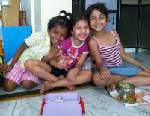
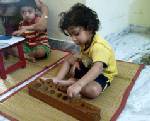
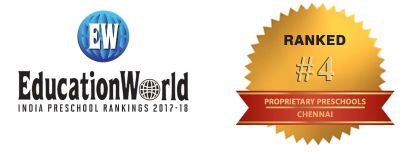 Learning Tree has been ranked 4th in Chennai for the 3rd year in succession in the preschool rankings for 2019 released by Education World in December 2019. The Times of India in a separate survey published in Jan 2019 has ranked Learning Tree 2nd among preschools in South Chennai.
Learning Tree has been ranked 4th in Chennai for the 3rd year in succession in the preschool rankings for 2019 released by Education World in December 2019. The Times of India in a separate survey published in Jan 2019 has ranked Learning Tree 2nd among preschools in South Chennai.

